Congratulations to T. Campbell and C. Fenton, winners of the mother! ticket giveaway. Enjoy the movie, and pass the popcorn!


Congratulations to T. Campbell and C. Fenton, winners of the mother! ticket giveaway. Enjoy the movie, and pass the popcorn!


Welcome! The lobby of the Deranged L.A. Crimes theater is open. Grab a bucket of popcorn, some Milk Duds and a Coke and find a seat. Tonight’s feature is PHANTOM OF CHINATOWN starring Keye Luke, Lotus Long and Grant Withers.
Enjoy the movie!
TCM says:
Dr. John Benton, in San Francisco following an archaeological expedition in the Mongolian desert, gives a film presentation for his colleagues. The film shows his discovery of the precious ancient tomb of a Ming emperor, for which archaeologists have been searching for centuries. The tomb contains a scroll that tells the secret of the Temple of Eternal Fire, which is of great financial importance to China as it could reveal an enormous untapped reserve of oil. The film of the trip shows a violent windstorm that erupted when the tomb was opened, in keeping with an ancient curse. Mason, the co-pilot on the trip, was lost during the storm, and the expedition party was forced to continue on without him.
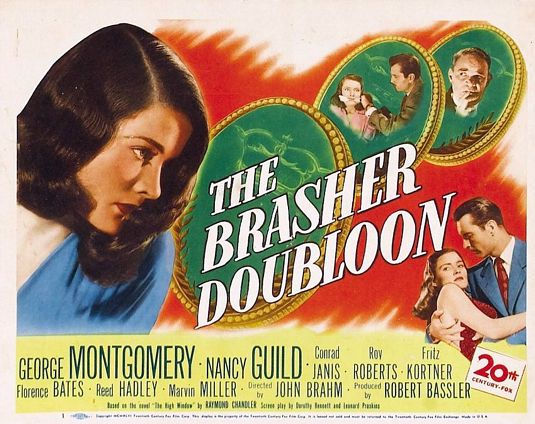
Welcome! The lobby of the Deranged L.A. Crimes theater is open. Grab a bucket of popcorn, some Milk Duds and a Coke and find a seat. Tonight’s feature is THE BRASHER DOUBLOON starring George Montgomery, Nancy Guild and Conrad Janis.
Enjoy the movie!
TCM says:
Philip Marlowe (George Montgomery) gets involved when limp-wristed and snidley Leslie Murdock (Conrad Janis) steals a rare doubloon from his mother (Florence Bates) to give to a newsreel photographer in exchange for film that is being used for blackmail purposes. Marlowe’s involvement has him encounter a girl who goes into hysterics when touched by a man; a husband-killing woman; three corpses; a couple of scuffles in which he gets his clock cleaned; a secretary who thinks she has killed her boss, which is the reason Raymond Chandler called his story “The High Window”, and a son (who qualifies as a S.O.B. by two definitions) who blackmails his widowed mother. So, what’s not to like.
https://youtu.be/0orGFuB0_18?list=PLNhCMC6512c8Zc0GLbmJEHl1tglC78T6U
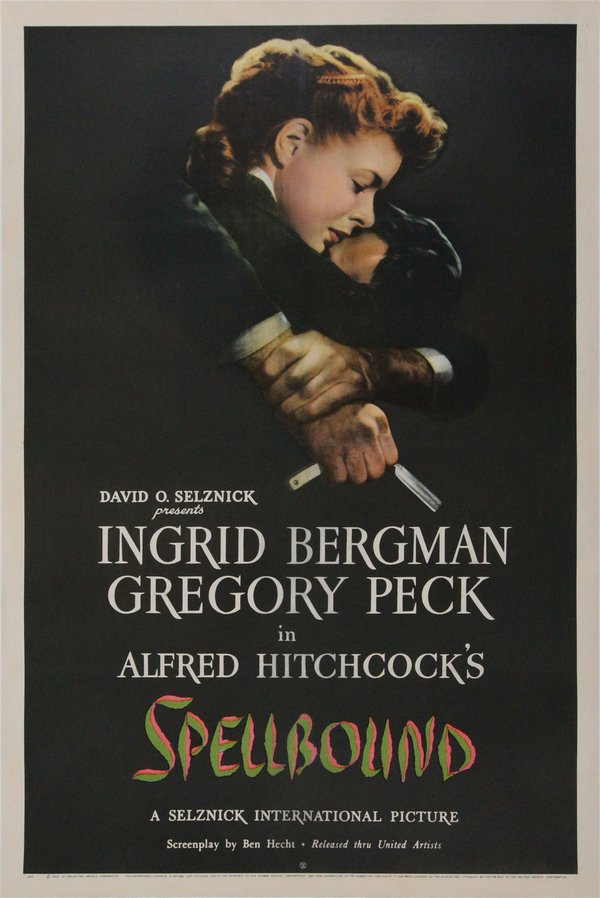
Welcome! The lobby of the Deranged L.A. Crimes theater is open. Grab a bucket of popcorn, some Milk Duds and a Coke and find a seat. Today’s feature is SPELLBOUND starring Ingrid Bergman and Gregory Peck.
Enjoy the movie!
TCM says:
When Dr. Anthony Edwardes, the distinguished psychologist who is to take over as head of Green Manors mental hospital, arrives at the countryside facility, his colleagues, including the outgoing head, Dr. Murchison, are surprised to see how young he is. That evening, Dr. Constance Peterson, the hospital’s only female psychologist, meets Dr. Edwardes at dinner and is immediately attracted to him. At the doctors’ table, Constance, who has been accused by her amorous colleague, Dr. Fleurot, of being cool and detached, talks animatedly about her idea for a woodside swimming pool and starts to draw her proposed design on the tablecloth with the sharp edge of her knife. Dr. Edwardes responds to the curved lines with a sudden burst of anger, baffling his peers.
https://youtu.be/Qku4jtvtay8

Illustration by Koren Shadmi originally posted to the L.A. WEEKLY on WEDNESDAY, NOVEMBER 16, 2016.
Stefan was the first of the Spitzer twins to get into trouble with the law–at least in the U.S. In 1980 he picked up a woman identified only as Terry B. Stefan said he was a French actor and told Terry she should be a model. Later that day Stefan forced himself into Terry’s apartment where he choked and raped her. He controlled her by telling her that he had killed before, in Israel. He was subsequently arrested, tried and acquitted for the attack on Terry.
In 1982 Stefan met Marci G. They dated one time without incident. On their second date the man Marci knew as Julian seemed different and, strangely, couldn’t recall details of their initial meeting or their first date. The man took Marci to his apartment where he sodomized and raped her until she bled, all the while threatening her with a fist to her face. Marci ID’d her attacker as George Spitzer. George was tried and acquitted.
Keri B met Stefan in 1983. Keri and Stefan had consensual sex, and then he left her for about an hour. When he returned Keri thought he seemed different. He was wearing the same clothes but they didn’t fit—the shirt sleeves and pants were too short. Another detail that alarmed Keri was that earlier he had been a sweet and sensual kisser. When he returned he was rough and he slobbered. Keri figured out that she’d been duped by the twins. She called them later and left voice message–she told them what they had done was disgusting.
In 1986 Trisha G was working in a hotel restaurant when the twins stopped in for cocktails. Trisha went to Stefan’s suite for champagne and pizza. She became sleepy and passed out. When she woke she was in bed, Stefan was strangling her with one hand and groping her with the other. She managed to scratch his face. She got away. Trisha reported the incident to the police but George visited her regularly at her job and threatened her. Trisha lost her job and had to move away because she feared the twins were members of the Mafia.
In January 1989, Jennifer P met George at a mall shoe store where she worked. She had wine with George at a café and then he took her home where they had consensual sex. Afterward, he raped her while she begged him to stop. When George was finished, Stefan came in. Jennifer could tell the difference and said so. It didn’t matter to the twins. Stefan raped her and then forced oral copulation. Jennifer reported the twins to the police.
George was questioned by the cops. He said that Jennifer manufactured the story to get revenge on him on him because he had refused to buy her dinner. The district attorney declined to prosecute.
George met Valerie O at a Beverly Hills nightclub. He said he needed to stop by his apartment to pick up his ATM card. Once they were inside the apartment George attempted to rape her but Valerie fought him off. The frightened woman watched as George masturbated in front of her and ejaculated into the sink. When Valerie returned to the nightclub later that night her friends saw the scratches on her arms and told her to phone 911.
George was tried, but the trial ended in a hung jury. He spent one day in jail and was referred to a shrink.
Crackdown Sought on ‘Date Rape’ Drug
Crime: Legislators seek to ban possession of Rohypnol, which is only made for foreign markets. — Los Angeles Times, June 8, 1996
One thing is certain, the drug was tailor made for bottom feeders like the Spitzers. They could slip the undetectable drug into a woman’s drink and turn her into a zombie sex toy with little or no memory.
‘Date Rate’ Drug Overdose Kills Girl — October 4, 1996 |
NEXT TIME: How long can the Spitzer’s rape rampage continue?
Sources:
Los Angeles Times
L.A. Weekly
ProQuest
Los Angeles Public Library
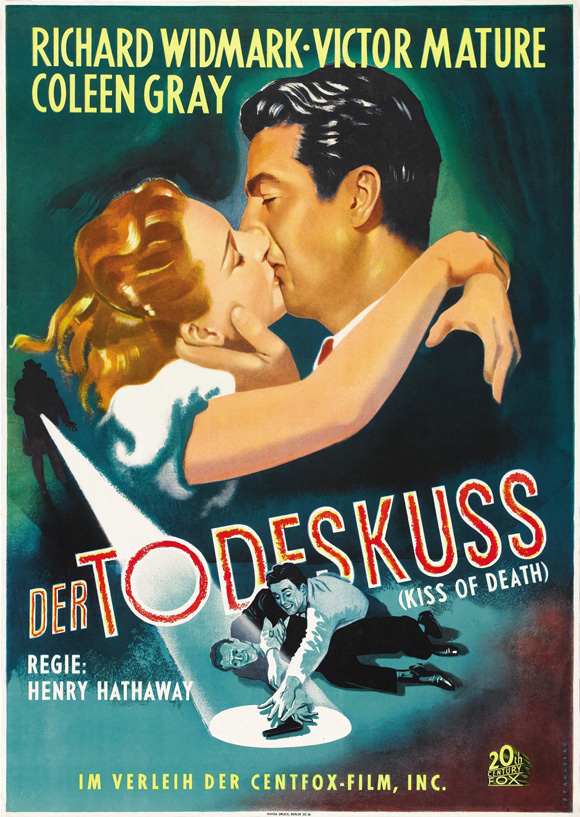
Welcome! The lobby of the Deranged L.A. Crimes theater is open! Grab a bucket of popcorn, some Milk Duds and a Coke and find a seat. Tonight’s feature is THE KISS OF DEATH starring Richard Widmark, Victor Mature, and Coleen Gray. This was Richard Widmark’s film debut, and he is unforgettable as Tommy Udo.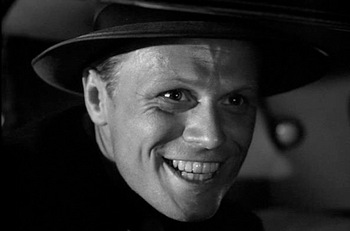
One of the reasons I selected this film is that it opened in 1947–the same year as one of the most notorious unsolved murders in Los Angeles’ history–the slaying of Elizabeth Short, the Black Dahlia. I’m covering the Dahlia case over the next couple of weeks. Enjoy the film.
TCM says:
On Christmas Eve, down-on-his-luck Nick Bianco, an ex-convict, and his three cohorts rob a jewelry store located on the top floor of a New York skyscraper. Before they can exit the building, however, the proprietor sets off his alarm, and Nick is apprehended by the police. Later, Assistant District Attorney Louis D’Angelo tries to persuade Nick, who has two young daughters and a wife, to name his accomplices in exchange for a light sentence. Sure that his lawyer, Earl Howser, and cohorts will look after his family while he is incarcerated, Nick refuses and is given a twenty-year sentence. Three years later, at Sing Sing Prison, Nick learns that his wife has committed suicide, and his daughters have been sent to an orphanage.
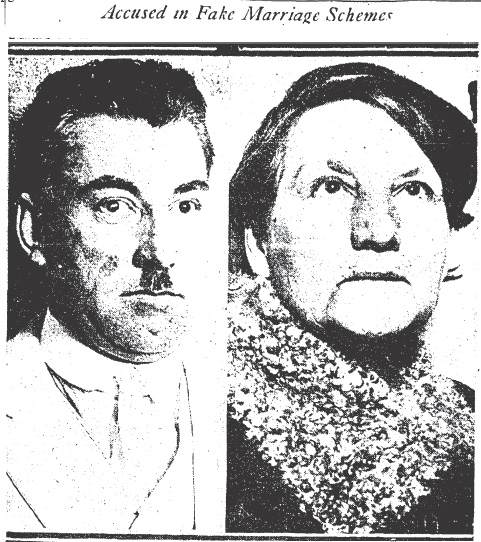
John Bertrum Clarke and Clara Berry
On July 19, 1924 the Los Angeles Times updated their readers on the status of the police investigation into John Bertrum Clarke: “The sordid activities of John Bertrum Clarke, author, minister of the Church of Cosmic Truth, and love pirate, unraveling gradually yesterday as police investigation went deeper into his life, included among other revolting incidents an attempt to enmesh a 15-year-old girl in the same maze of occult and physical domination that the man essayed with practically every woman with whom he came in contact.”
For his part, John continued to declare his love for Cecyle Duncan, the police operative he had wed in a bogus ceremony he had conducted himself. Wearing a white serge suit, white shoes, and white hat, all of which were stained with grease and smudged with dirt, John declared his undying affection for Cecyle. He insisted that she was the love of his life and he couldn’t believe that she would betray him. John said: “…She is my real love. The marriage is entirely legal. It is my great work, my book, my work…”
The police searched John’s card and correspondence files (he, or more likely his assistant Cora, was a meticulous record keeper) and found a girl named Clara Tautrim, 946 Grattan Street. She was only 14-years-old in 1923 when she first met John. He was distributing his literature door-to-door and some of it looked interesting to her. On her first visit she was accompanied by an older female acquaintance and nothing untoward occurred.
 In May 1924 John initiated contact with Clara and asked her to visit him at his South Fremont apartment. He said he could help her find a job. Clara stopped by his apartment on her way home from school. She’d barely put a foot in the door when he began to bombard her with his usual line of patter. She was his soul mate and together they would amass a fortune and live on a sumptuous estate in India. Wild-eyed and rambling, John grabbed Clara and kissed her–it was then that she became truly frightened. John, over 30 years her senior, wasn’t exactly Clara’s dream man. Besides he was behaving like a lunatic. Clarke’s big plan was to make her a motion picture star. Clara wasn’t in the least bit starstruck and had no desire to pursue a career in show business. John refused to hear her out and began a letter to C.I. Berry. Berry, he explained, was a male director and a big wheel in motion pictures. Of course the fictional director was none other than his favorite patsy and faithful amanuensis, Cora Irene Berry Gillen.
In May 1924 John initiated contact with Clara and asked her to visit him at his South Fremont apartment. He said he could help her find a job. Clara stopped by his apartment on her way home from school. She’d barely put a foot in the door when he began to bombard her with his usual line of patter. She was his soul mate and together they would amass a fortune and live on a sumptuous estate in India. Wild-eyed and rambling, John grabbed Clara and kissed her–it was then that she became truly frightened. John, over 30 years her senior, wasn’t exactly Clara’s dream man. Besides he was behaving like a lunatic. Clarke’s big plan was to make her a motion picture star. Clara wasn’t in the least bit starstruck and had no desire to pursue a career in show business. John refused to hear her out and began a letter to C.I. Berry. Berry, he explained, was a male director and a big wheel in motion pictures. Of course the fictional director was none other than his favorite patsy and faithful amanuensis, Cora Irene Berry Gillen.
Clara managed to disengage herself from John’s embrace and left, but not before he made her promise to return the next day. She did as she’d promised, but wisely brought her mother Caroline with her. John was briefly thrown off-stride when he saw Caroline but he soon recovered himself and pitched a few of his crackpot plans for Clara’s stardom to her disbelieving mother. He said that if Clara was entrusted to his care he would take her to India where she would be a princess. Caroline refused to part with her daughter, so John modified his plan to include Caroline. The three of them could go to India and live in the lap of luxury. When Caroline rebuffed him, John became distraught. He said that their refusal would mean he would never attain the power or recognition he deserved. As soon as they were able Caroline and Clara bolted from John’s apartment.
John’s ego was so massive that Caroline’s rejection didn’t dissuade him from his further pursuit of Clara. He called the Tautrim home repeatedly. When the calls didn’t give him the results he wanted, he appeared on their doorstep. He arrived bearing a letter and $5 for Clara. He said if she would come to his apartment the next day he’d buy her a new hat. When he was told that Clara wasn’t at home he left the letter, but kept the $5.
John’s relentless pursuit of Clara ended only when her mother said she was going to call the police and have him arrested. Clara told investigators: “I was afraid of him. I did not know what he was talking about half the time, but I did not like to have him kiss me or put his hands on me. He told me he was going to take me to India to become a princess or something, and he was going to give me jewels and pretty things. When mother told him I could not go he said we had spoiled his plans to become a ruler of the world.”
The police thought that they had sufficient grounds to charge John with contributing to the delinquency of a minor but they couldn’t make it stick and had to cut him loose. If the goal was to see John behind bars the police would need more. Fortunately there was plenty of dirt to dig up on John.
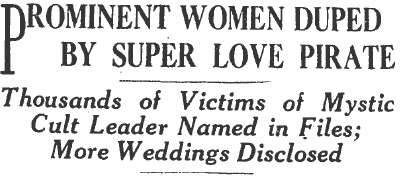 Captain Plummer and Detectives Hoskins, Berenzweig, and Harris uncovered voluminous files consisting of cards, correspondence. The detectives found evidence that John had married at least three women in the month prior to his arrest. The mountain of documents proved that John had likely victimized thousands of women. John wasn’t discriminating, any woman with whom he came in contact was a potential victim. He had romanced or terrorized movie actresses, social workers, elderly women, and teenage girls.
Captain Plummer and Detectives Hoskins, Berenzweig, and Harris uncovered voluminous files consisting of cards, correspondence. The detectives found evidence that John had married at least three women in the month prior to his arrest. The mountain of documents proved that John had likely victimized thousands of women. John wasn’t discriminating, any woman with whom he came in contact was a potential victim. He had romanced or terrorized movie actresses, social workers, elderly women, and teenage girls.
The most astonishing revelation was a “soul slave contract” between John and Corinne Bradford Ko’Vert. Corinne’s stage name was Mary Savage (IDMB shows two film credits for her under Corinne Bradford). The contract was dated May 14, 1922 and signed by both parties and witnessed by Mildred Gillen, undoubtedly an alias for Clara I. Berry.
Here is the document in full:
“I, the undersigned, Corinne Bradford Ko’Vert, hereby make a voluntary contract and agreement with John Bertrum Clarke to do what he tells me to do in a business and social way for a period of one year from May 14, 1922 to May 14, 1923. I will see him during this time when practical every day by appointment and will keep him informed in full of all my engagements in business and social life, and will make no radical changes without consulting him. I will make every effort and resolve to keep control of myself and my temper, and I will do every practical possible thing to win a favorable reception and large salary or income in the motion-picture business.
“I will take the best care of my health, keep regular hours and habits of eating, sleeping, etc. I wll abstain from all use of habit forming drugs, intoxicating liquors, and tobacco, except when the actual picture work during acting requires the smoking of cigarettes.
“I shall be very careful of my public or semi-public activities and endeavor to maintain a good public reputation.
“I will make no contract with any person, persons or corporations that would interfere with my carrying out the above agreement with Clarke.
“In witness whereof I affix my signature this day of May, 1922.”
In addition to the contract detectives found two notes totaling $460 (equivalent to $6517.88 in 2016 dollars). Apparently Mary found the contract too restrictive because she wrote John a note amending its conditions:
“To see you every day as you wished takes very nearly the whole afternoon, leaving not time for other matters. I will see you when it is possible, and we will have to let it go at that. I am so sorry not to have been in to see you, but after returning home the other day I thought things over and came to the realization we were wasting a lot of perfectly good time and getting nowhere.”
Mary successfully avoided reporters but they found her husband, Frederick Ko’Vert, in his dance studio at 3790 Denker Avnue. The couple had an unusual marriage. Frederick was a well known female impersonator and evidently Mary was equally well known as a male impersonator. With so much in common you’d think that they would have gotten along but according to Frederick: “We never lived together and separated the day after our marriage.” In fact their divorce had recently become final. He said he’d never heard anything about John and had no idea who he was.
Reporters had no problem finding John, he was in the City Jail. He had no reservaations and talked freely about the contract: “Miss Bradford was brought to me by her mother. I have known Mrs. Bradford for several years. The girl had been working very hard. She was to be starred in a play and was to be made a motion picture star. She was disappointed, discouraged and betrayed in a business way by the people she trusted. So she came to me for spiritual and mental help and for business advice. The contract was the result.” What about the $460? John said the money was to pay for his assistance and he made no profit.
John’s papers didn’t only reveal the soul slave contract. Detectives found correspondence that showed he was attempting to establish an enormous spy network so he could capitalize on confidential information he received from hundreds of his clients from a wide variety of fields. The motion picture business in particular had the potential to make John a fortune. He had set his sights on an attorney, Herman L. Roth–but before John could get a dime from him the attorney was convicted and sentenced to San Quentin for extortion.
The newspapers reported daily on John’s misdeeds. It appeared that there was no end to the schemes he had concocted to separate gullible people from their money. The sexual misconduct was disturbing, but what if the man the press was calling a “Love Pirate” had actually been responsible for the death of two women?
NEXT TIME: Two suicides?
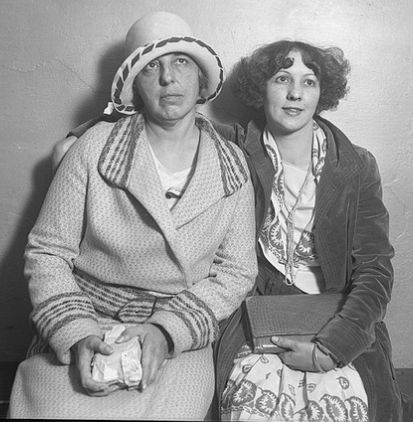
The Great Eleven Club cult leaders, May Otis Blackburn and her daughter, Ruth Wieland.
On Monday, March 31, 1930 TIME magazine ran an article entitled “California Cults”. The rise of cults in California, and elsewhere in the world, was just one of the ways in which people responded to the devastation and loss of life suffered during World War I.
TIME told its readers that: “Agnosticism and atheism are on the rise.” The article continued: “Thousands of persons dissatisfied with the faiths of their fathers, seek new spiritual footholds. This, as always in such troubled times, there is a flourishing of cults, of religious novelties and new fashions in faith. Flowery, sun-drenched California, where Nature exhibits herself in mystical opulence, where plenty of people have plenty of money, where there are many invalids contemplating eternity, is particularly propitious for this flourishing.”
Those seeking enlightenment are occasionally vulnerable and can be easy prey for the greedy, cynical, and deviant among us. When the search for truth starts costing you a bundle and/or the leader of your sect appears more interested in groping your physical body than in nurturing your spirit, call the cops.

By July 1924 John Bertrum Clarke, leader of the Church of Cosmic Truth, had a good thing going. He answered ads in local newspapers placed by women who were desperate for employment, usually as stenographers or typists. He conducted interviews in his apartment at 425 South Fremont near 6th Street and his modus operandi was nearly always the same. The first few minutes of the interview were about business, but then quickly developed into a marriage proposal followed by a ceremony in which John was both the groom and the officiant. After the bogus ceremony concluded the groom would attempt, and occasionally succeed, in sexually assaulting the applicant/bride.
Finally the mother of one of John’s underage victims contacted the LAPD and they began an investigation into his activities. They set the hook with bait they knew John would find irresistible–an ad in the Los Angeles Times that read: “Young girl would like typing to do at home or will work at office or private residence. Prices reasonable.” It wasn’t long before John contacted the applicant. He wasn’t aware that the job hopeful was Cecyle Duncan, a police operative. He wrote to her a couple of times, even sending her love poems, before turning up in the flesh at the bungalow court on South Union Avenue where she was staying. She invited John in and he quickly abandoned all pretense of offering her a job. Instead he launched into a bizarre tale from his youth.
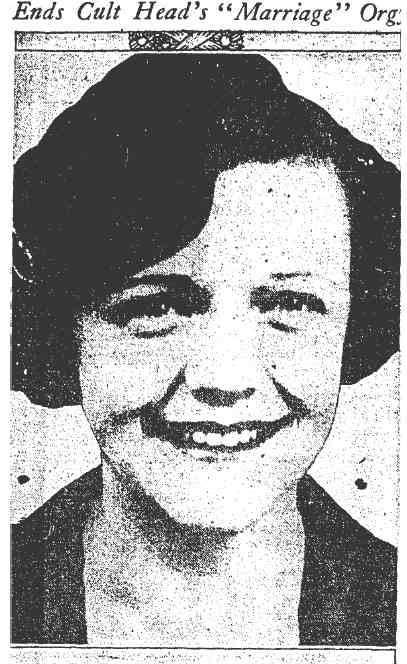
Headline over photo of Cecyle Duncan reads: “Ends Cult Head’s Marriage Orgy”
He said that when he was a child he was seriously bitten by a dog. His father was so irate over the incident that he forced John to kill the offending canine. John described the scene: “As the dog expired his spirit was released and entered my breast, which made of me a god. Dog spelled backward is ‘god’. Sometime when man reaches true understanding and comes to appreciate the significance of words spelled backward he will discover that he has been worshiping dogs these many centuries.”
John had explored the hidden meanings of various words spelled backwards in his text The Chart of the Mind. Copies of John’s works are still available–however, I don’t own any. So, without a copy of the tome in front of me I can only imagine what other words seized his imagination. I’ll bet one was: Lived/Devil. My personal favorite is Desserts/Stressed, but I doubt that the combo would lend itself to a sinister or cosmic interpretation.
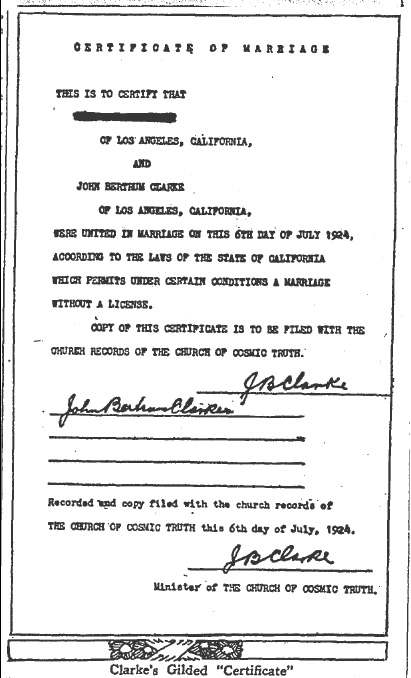
Bogus certificate of marriage.
Cecyle was rightfully concerned by John’s behavior–the dog story alone would be cause for pause (paws?). She became even more uncomfortable after he hurled himself at her feet, smothered them in kisses, and declared her his soul mate. He said that an aged female seer in India had prophesied that he, in tandem with his soul mate, would rule the world. Cecyle managed to escape his further attentions by accepting an autographed copy of his book and promising to meet him later that evening at his apartment.
She immediately informed her LAPD handlers of the appointment. She would definitely need back-up. As agreed she went to John’s apartment while Captain of Police Plummer and several detectives waited outside for her signal. The detectives began to get nervous when they’d been waiting for a while without word, so rather than risk Cecyle’s safety they broke down the door. Their timing was impeccable—John was making a move on his bride. The crazed man interrupted his assault while he attempted, unsuccessfully, to grab Detective Lieutenant Hoskins’ pistol.
Cecyle had quite a tale to tell the detectives. Apparently John had performed a ceremony which he claimed made them husband and wife. The unwilling bride was presented with a marriage certificate, an engraved wedding ring of inferior quality bearing the inscription “J.B.C. to C.A.D”., a pair of cheap earrings, and a comparably inexpensive brooch. The sham ceremony was attended only by John, Cecyle, and Clara Irene Berry, thought to be a former secretary of the cult. She was arrested outside the apartment house after she had gone to John’s room to sign the marriage certificate.
With John in custody the investigation into the Church of Cosmic Truth was beginning in earnest. Police wanted to know how many women had been victimized by the false prophet.
NEXT TIME: Revelations about John’s past and a “soul slave” pact.
NOTE: My friend, and Esotouric Bus Adventures crime buddy, Kim Cooper, was so fascinated by the tale of The Great Eleven cult (see photo at beginning of post) that she wrote a book about it: THE KEPT GIRL. If you’d like to know more about Kim and her book, read my interview with her here.
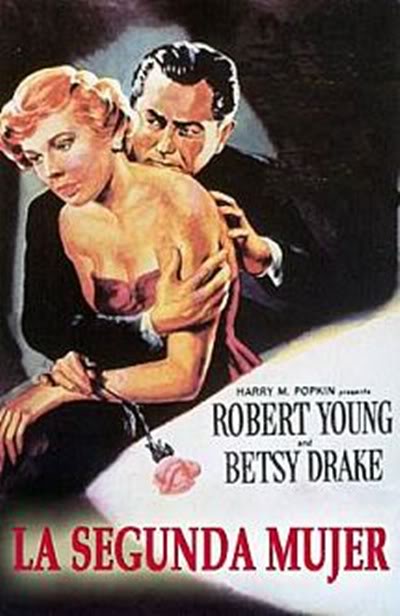
Welcome! The lobby of the Deranged L.A. Crimes theater is open! Grab a bucket of popcorn, some Milk Duds and a Coke and find a seat. Tonight’s feature is THE SECOND WOMAN starring Robert Young and Betsy Drake. Enjoy the movie!
TCM says:
In flashback from a ‘Rebecca’-style beginning: Ellen Foster, visiting her aunt on the California coast, meets neighbor Jeff Cohalan and his ultramodern clifftop house. Ellen is strongly attracted to Jeff, who’s being plagued by unexplainable accidents, major and minor. Bad luck, persecution…or paranoia? Warned that Jeff could be dangerous, Ellen fears that he’s in danger, as the menacing atmosphere darkens.
https://youtu.be/iBIvOsL59BY
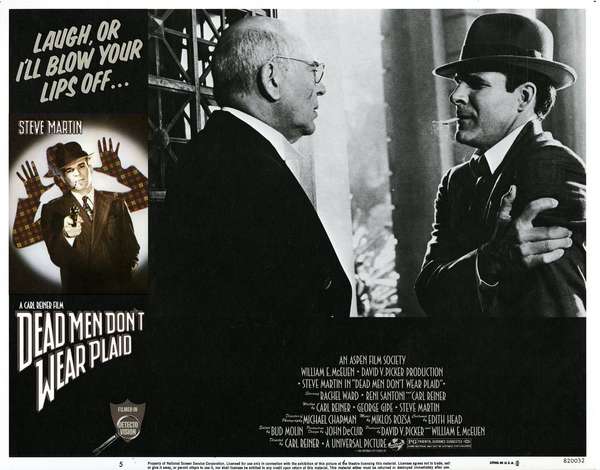
Welcome! The lobby of the Deranged L.A. Crimes theater is open! Grab a bucket of popcorn, some Milk Duds and a Coke and find a seat. Tonight’s feature is a comedic homage to noir: DEAD MEN DON’T WEAR PLAID starring Steve Martin, Rachel Ward and Carl Reiner. Enjoy the movie!
IDMB says:
When a famous cheese maker dies in a freak car crash, his daughter (Rachel Ward) is convinced that it was no accident. She thinks he was murdered for his top-secret cheese recipes. To prove her theory, she hires detective Roy Reardon (Steve Martin). His quest to find out what happened to the missing man brings him face-to-face with movie legends, actors such as Humphrey Bogart, Alan Ladd and Burt Lancaster, via footage from classic film noir and crime films.
https://youtu.be/5-7fWkqbKv4